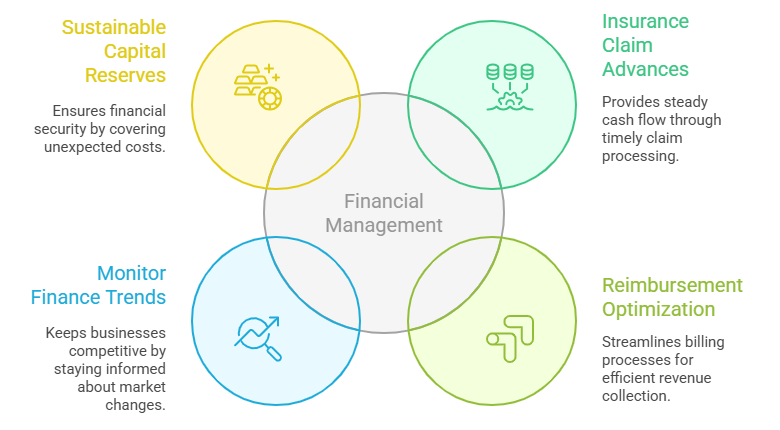Outpatient clinics face unique financial challenges that require strategic planning and flexible funding solutions. Between insurance reimbursement delays and unexpected staffing needs, maintaining steady cash flow can become a complex balancing act that impacts daily operations.
Essential Do's for Clinic Financial Management

Implementing the right funding strategies for outpatient clinics requires a proactive approach that addresses both immediate needs and long-term sustainability. These proven practices can help maintain day-to-day liquidity while preparing for future challenges.
- Utilize insurance claim advances to bridge the gap between service delivery and reimbursement, ensuring steady cash flow during payor delays
- Implement reimbursement optimization strategies that streamline billing processes and reduce the time between claims submission and payment
- Monitor healthcare finance trends regularly to adjust funding strategies and maintain competitiveness in the changing market landscape
- Establish sustainable capital reserves that can cover staffing surges and operational expenses during unexpected financial pressures
Financial Pitfalls to Avoid in Clinic Operations
Understanding what not to do is equally important when developing effective funding strategies for outpatient clinics. Avoiding these common mistakes can prevent financial strain and operational disruptions.
- Don't rely solely on insurance reimbursements without backup funding options, as delays can create significant cash flow gaps that affect daily operations
- Don't ignore early warning signs of reimbursement challenges, which could compound into larger financial stability issues if left unaddressed
- Don't overlook cost mitigation opportunities that could reduce operational expenses and improve overall financial efficiency during challenging periods
- Don't postpone financial planning until problems arise, as reactive approaches often result in more expensive and limited funding options
Managing Insurance Reimbursement Gaps Effectively
Insurance reimbursement gaps represent one of the most significant challenges facing outpatient clinics today. These delays can create substantial pressure on day-to-day liquidity, making it difficult to maintain consistent operations and staff levels.
Short-term financing options, particularly insurance claim advances, have emerged as valuable tools for managing these gaps. By providing funding based on pending claims, these solutions help clinics maintain operational stability while waiting for payor settlements.
Cost mitigation strategies also play a crucial role in managing financial pressures. Clinics that identify and solve reimbursement challenges proactively tend to experience enhanced financial stability and improved operational efficiency. This approach allows healthcare providers to anticipate potential disruptions and implement preventive measures before problems escalate.
Effective funding strategies for outpatient clinics require a combination of proactive planning, flexible financing solutions, and ongoing optimization efforts. By addressing insurance reimbursement gaps and maintaining sustainable capital reserves, clinics can navigate financial challenges while continuing to provide quality patient care.

.png)






